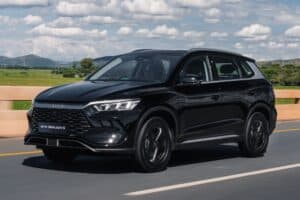Positioned below the XC40, the EX30 becomes Volvo's most substantiable model and with a price tag below R1-million.

On the drawing board as far back as 2019, then known as the still-born XC30 that would have formed part of an expansive XC range, Volvo, after a series of teaser images, has officially debuted the EX30 as its smallest all-electric SUV.
Confirmed for South Africa from the first quarter of next year, the EX30 debuts not only as the Chinese-owned Swedish newest model, but also one with the smallest CO2 footprint of any Volvo ever made.
Evolution of Thor
Styled to resemble the senior EX90 from the front and the recently launched-in-South Africa C40 Recharge when viewed from the rear, the EX30 rides on the same Scalable Production Architecture 2 (SPA2) as its sibling, unsurprisingly with smaller dimensions and capable of providing seating for five instead of seven.
Set to slot-in below the mild-hybrid XC40 and therefore its associated P6 and P8 Recharge models, the EX30 measures 4 233 mm long, 1 555 mm tall and 1 837 mm wide while riding on a wheelbase stretching 2 650 mm.
ALSO READ: Volvo EX30 teased again with coupe looks and uncluttered interior
Launched under the tag line “Small yet mighty”, the EX30 follows the same design method as the EX90 by receiving Volvo’s latest T-shaped Thor’s Hammer LED headlights with individual diodes, a sealed grille and, as mentioned, a lowered coupe-like roofline, plus stacked LED taillights split into an upper section and a lower C-shaped arrangement.

Confirmed to ride on 18-inch or 19-inch alloy wheels, the EX30, despite it intended use as largely an urban SUV, will be offered with an optional Cross Country package comprising a blacked-out grille panel, front and rear skidplates underneath the bumper, black detailing on the bootlid and unique Cross Country badges.
Minimalist and digital inside
As hinted by the most recent teaser image this month, the EX30 sports an interior similar in places to the EX90, but with a number of unique touches.

These include a model specific steering wheel, horizonal instead of vertical climate control vents, a thin and unique instrument binnacle situated on top of the steering column and a centre console separate from the dashboard itself.
The latter’s design also being more concave than on the EX90, the EX30’s main standout comprises a sound bar developed in partnership with Harman Kardon integrated underneath the windscreen as part of the 1 000-watt sound system, and a new 12.3-inch infotainment system complete with the latest Google Android operating system, wireless Apple CarPlay and Android Auto, 5G and over-the-air updates.

Conforming to the same minimalist interior design as the EX90, the EX30 does away with the majority of physical switchgear, with the centre console, which sports slide-out cupholder tray, also being devoid of a gear lever that now moves to the steering column.
Green aspect
Its cabin designed to create “a sense of calm”, the EX30’s reduced carbon footprint comes in the form of various materials and veneers being made from 75% recycled polyester, denim and wool on the dashboard, seats and doors, while plastics made from 17% recycled bottles have been incorporated into the seats.

In addition, no less than four leather-free upholstery options have been availed, along with five ambient themes claimed to have been “inspired by Scandinavian landscapes”.
EV to the power of four
Residing underneath, the EX30’s EV powerunit comprises three derivatives, both confirmed for South Africa.
Kicking the range off, the entry-level Core derives motivation from a 51-kWh lithium-ion phosphate battery pack that develops 134 kW and allows for a range of 344 km, while propelling the EX30 from 0-100 km/h in 5.7 seconds and on to a limited top speed of 180 km/h.
Still with a single motor, the step-up Plus and Ultra models gain a more powerful 69-kWh battery that makes for a combined system output of 200 kW, a top speed still limited to 180 km/h and 0-100 km/h in 5.3 seconds. The claimed range is the also the most of any EX30 at 480 km.

Completing the range, the so-called Twin Motor Performance version adds a second electric motor to the mix for an effective all-wheel-drive layout.
While also powered by the latter battery pack and available only in Plus and Ultra trim guises, the result is a final output of 315 kW, a range of 460 km and 0-100 km/h in 3.6 seconds. Top speed, as with the rest of the range, is limited to 180 km/h.
In terms of charging, three methods are provided, though when plugged-in to a public charger outlet, waiting time totals just under 30 minutes. Worth noting though is the Core supports public charging up to 134 kW and the Plus and Ultra up to 153 kW.
Yes, it is coming
As mentioned, all three power trim levels and power modules have been confirmed for South Africa with order books opening this coming Thursday (8 June).
Price
- EX30 Core – R775 900
- EX30 Plus – R865 900
- EX30 Ultra – R965 900
- EX30 Twin Power Performance – R935 900
- EX30 Twin Power Performance – R995 900
NOW READ: ‘Small big deal’ new Volvo EX30 teased ahead of 7 June reveal






